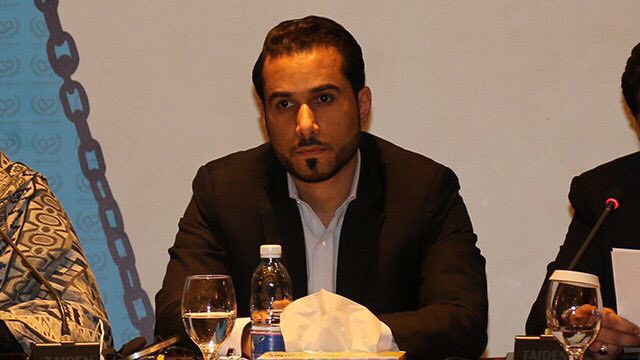Update: On 8 July, Mohamed Khalil al-Shakhoori reappeared in government custody at the Dry Dock Detention Center. His family has only been able to visit him once and the authorities have denied him access to a lawyer. Along with Ebtisam al-Saegh and activist Radhi Saleh al-Qatari, Shakhoori is being held on terror charges.
For the second time in as many days the Bahraini authorities have carried out an enforced disappearance against a human rights activist. This new incommunicado detention, coming on the heels of the re-detention of Ebtesam al-Sayegh, indicates that the Bahraini state is determined to continue its relentless targeting of human rights defenders.
At dawn on 4 July, Mohamed Khalil al-Shakhoori, a 33-year-old human rights defender, was seized from his home by masked plainclothes security forces, operating without a warrant. No cause for arrest was given as he was removed to an undisclosed location.
Al-Shakhoori had recently been a victim of torture, when in May 2017 he was summoned to the security facility in the city of Muharraq, which is known to be a base of operations for the infamous National Security Agency. At Muharraq he was beaten, sexually abused, and subjected to electrical shock for several hours. The officers torturing him made clear that their intent was to deter him from continuing his activities in the human rights field. The likely reason for his re-detention is his continuing activism, which has included dissemination of the details of his torture.
As of this writing, over 24 hours after the initial detention, Mr. al-Shakhoori remains disappeared. Though inquiries have been made with several security agencies, none will acknowledge holding him. No relative or attorney has received a phone call from him or notice that he is in custody.
Enforced disappearance is a particularly heinous crime. The “refusal to disclose the fate or whereabouts of the persons … places such persons outside the protection of the law,” as one definition of the practice notes. Though some Bahraini citizens initially held incommunicado resurface, within days or weeks, in detention centers, prisons, or partisan judicial proceedings, some remain in the dark for months, subject to the untrammeled power of an oppressive state.
As noted, Mr. al-Shakhoori’s seizure comes on the heels of the still ongoing disappearance of Ms. al-Sayegh. The latest reports on al-Sayegh indicate that she has been seen by other prisoners bearing obvious signs of physical abuse at the women’s detention facility in the city of Isa, but to date no state agency has acknowledged that it is holding her and no attorneys or rights monitoring groups have been able to see her and verify her well-being.
Ms. al-Sayegh’s seizure in its turn followed the closure of al-Wasat, which was Bahrain’s only independent newspaper. In the words of the Bahrain Independent Commission of Inquiry (PDF), all other dailies are “pro-government and are owned by figures closely associated with the GoB [Government of Bahrain],” while “Radio and television broadcasts in Bahrain are all State-controlled.” The shuttering of al-Wasat came after the dissolution of al-Wefaq and Wa’ad, the country’s last major opposition groups. These events coincided with or followed the reinstitution of executions and a sharp uptick in death sentences; the re-empowerment of the National Security Agency; amendment of the constitution to allow for military trial of civilians; the violent crackdown on the long-term sit-in at Duraz, which left five dead in “unlawful killings” (Office of the United Nations High Commissioner for Human Rights); and the renewed trial of prominent political prisoner Nabeel Rajab, who has spent most of the past five years in jail on charges that are openly directed at quashing his freedom of speech.
Concerned international actors must call forcefully for the immediate release of Mr. al-Shakhoori, Ms. al-Sayegh, and all other political prisoners. Unless there is a forceful reaction from the global community, dissent itself may soon disappear within Bahrain.





